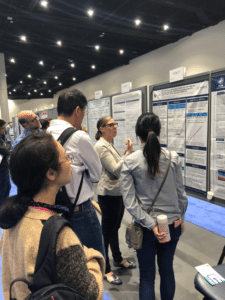Last month’s annual meeting of the American Society of Human Genetics in San Diego was a terrific reminder of how much progress is being made in this field — both in our basic understanding of human biology and in our ability to rapidly translate discoveries into clinical utility.

The PacBio team had the privilege of hosting an educational workshop about the value of long-read SMRT Sequencing for human genetic applications. Customers from Mount Sinai and Stanford University offered their perspectives, while PacBio scientists presented data and the technology roadmap. Here, we recap the highlights and provide recordings for anyone who could not attend.
From the Icahn School of Medicine at Mount Sinai, Assistant Professor Stuart Scott gave a talk about using the PacBio system for amplicon sequencing in pharmacogenomics and clinical genomics workflows. Accurate, phased amplicons for the CYP2D6 gene, for example, has allowed his team to reclassify up to 20% of samples, providing data that’s critical for drug metabolism and dosing. In clinical genomics, Scott presented several case studies illustrating the utility of highly accurate, long-read sequencing for assessing copy number variants and for confirming a suspected medical diagnosis in rare disease patients. He noted that the latest Sequel System chemistry improved throughput and read length, as well as reducing error profile and increasing the capacity for multiplexing.
Watch Stuart Scott’s presentation
In a separate talk, Janet Song from Stanford School of Medicine spoke about resolving a tandem repeat array implicated in bipolar disorder and schizophrenia. These psychiatric diseases share a number of associated genomic regions, she noted, however scientists continue to search for a specific causal risk variant in the CACNA1C gene suggested by previous genome-wide association studies. SMRT Sequencing of this region in 16 individuals identified a series of 30-mer repeats, containing a total of about 50 variants. Analysis showed that 10 variants were linked to protective or risk haplotypes. Song said she hopes to study the function of these variants in mouse models or human brain organoid models in the future.
Watch Janet Song’s presentation

Our Principal Scientist Elizabeth Tseng (@Magdoll) showed how the Iso-Seq method can be used to discover disease-associated alternative splicing. This approach to isoform sequencing yields accurate, full-length transcripts requiring no assembly, and is therefore ideal for disease studies that need a more comprehensive picture of alternative splicing activity. Tseng offered several published examples of how the Iso-Seq method has been used for everything from single-gene studies to whole-transcriptome studies, and also detailed how the latest Sequel System chemistry recovers more genes and produces more usable reads.
Watch Elizabeth Tseng’s presentation
Finally, our CSO Jonas Korlach walked attendees through recent product updates and the coming technology roadmap. The Sequel System 6.0 release offered major improvements to accuracy, throughput, structural variant calling, and large-insert libraries, he said, showing examples of 35 kb libraries. Looking ahead, Korlach said that the V2 express library preparation product should be available early in 2019, with the new 8M SMRT Cell being introduced sometime later.
Watch Jonas Korlach’s presentation
In addition to the workshop, we also presented several posters during the event:
- A Simple Segue from Sanger to High-throughput SMRT Sequencing with an M13 Barcoding System – Lori Aro, PacBio
- FALCON-Phase integrates PacBio and HiC data for de novo assembly, scaffolding and phasing of a diploid Puerto Rican genome (HG00733) – Sarah Kingan, PacBio
- No-amp Targeted SMRT Sequencing using a CRISPR-Cas9 Enrichment Method – Jenny Ekholm, PacBio
- Joint Calling and PacBio SMRT Sequencing for Indel and Structural Variant Detection in Populations – Aaron Wenger, PacBio
We’d like to thank our speakers and all the ASHG scientists who took time out of a busy conference to attend our workshop and stop by our posters. Stay tuned for further coverage of the event.